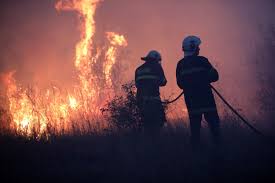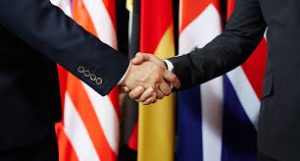Bulgaria’s wildfires: More aid for families as political blame game erupts

Sofia: Bulgaria’s Cabinet has increased the aid for families affected by the numerous wildfires plaguing the country amid high temperatures and strong winds, while the inevitable political row has erupted about the crisis.
Social Policy Minister Borislav Gutsanov said on July 30 that the Cabinet had allocated 900 000 leva for families affected by the fires.
“So far they could apply for 1914 leva, we are granting another 3000 leva per family, so it becomes 5000 leva per family,” Gutsanov said.
Key to the political row about coping with the wildfires is whether Bulgaria has adequate equipment, including fire-fighting aircraft. Last year, Parliament voted to oblige the government to act on the matter.
In recent days, help has come from other European Union countries and from Türkiye to combat the blazes.
On July 27, head of state President Roumen Radev, who routinely criticises the government, accused those in power of failing to provide adequate equipment.
“Tomorrow, our military will have a maximum of two Cougar aircrafts and one Mi-17,” Radev was quoted as saying by Bulgarian news agency BTA
He said that last year Parliament had approved a resolution obliging the Cabinet to purchase specialised aircraft for firefighting.
“Since then, there has been indifference, procrastination, and a ‘let’s hope it passes’ attitude,” Radev said. “It will not pass because the fires are becoming more frequent. We must have our own capabilities for aerial firefighting. The existing ones are extremely insufficient,” he said.
Prime Minister Rossen Zhelyazkov, speaking on July 30 at the start of a regular meeting of the Cabinet, said that on July 31, a report would be tabled in Parliament on the actions taken to use EU funds to buy specialised equipment.
Zhelyazkov said that an interdepartmental analysis is currently being carried out with the participation of the Ministry of Defence, the Ministry of Interior and the Ministry of Transport and Communications.
The analysis covers the necessary aircraft equipment, the available and operated airport infrastructure, as well as the readiness of trained personnel to use it. The goal is to find an interdepartmental approach for the effective and efficient use of this resource.
Zhelyazkov said that in August, Bulgaria will rely on the available equipment and aircraft from Sweden, which will remain in Bulgaria throughout the month to help extinguish fires.
Former Prime Minister Boiko Borissov, leader of Parliament’s largest group GERB-UDF, holder of the mandate to govern, told reporters on July 30: “a good option is to create a joint company between three ministries, which would purchase equipment on lease”.
Borissov said that helicopters were a better option than fixed-wing aircraft, because such aircraft can only fill with water from the sea or large reservoirs and are much more complicated to pilot and maintain.
He criticised Zhelyazkov for the lack of action on the 170 million leva already earmarked for firefighting equipment last year:
“Since last year, there have been 170 million for helicopters, but nothing has been done. Zhelyazkov has been in power for six-seven months now – has he checked this money?” Borissov said.
At the beginning of the July 30 sitting of the National Assembly, largest opposition group We Continue the Change – Democratic Bulgaria called for a hearing of Interior Minister Daniel Mitov on the fire situation.
Former Prime Minister Nikolai Denkov, co-leader of the WCC-DB group, said: “These hearings are not to torture the minister, but to see what has been done”. WCC-DB’s request was refused, with the opposition of the de facto ruling majority.
Denkov said that in 2024, when he was PM, the government had allocated the 170 million leva for firefighting equipment.
“In 2024, there were again very severe fires, we had a meeting in the National Assembly, at which options were discussed on how to prepare for 2025. What became clear is that the fastest way to find a solution is to retrofit four helicopters with additional so-called pockets,” Denkov said.
He said that the problem with spending the funds is whether to buy fixed-wing aircraft or to re-equip the helicopters.
“The whole argument is about whether to spend a lot of money to buy aircraft or to do the work and re-equip the helicopters. And because the Ministry of Interior and the Air Force are arguing and the ministers cannot reach an agreement, that’s why we currently don’t have the equipment to work with,” Denkov said.
Under the EU Civil Protection Mechanism, two aircraft from Sweden arrived at Plovdiv Airport on July 30 to join the fight against the fires.
The crews were welcomed by Deputy Minister of Interior Toni Todorov and other senior officials.
“They are about to be briefed on the situation, will undergo a briefing and will fly to Pirin,” Todorov said.
“The aircraft’s tank holds three tons of water. Fortunately, access to water will be with a short flight approach. The extinguishing capacity has been increased – eight aircraft will work in the air today, but despite the measures taken, the good strategy and organization, the wind remains a major negative factor,” he said.
Interior Minister Mitov, speaking to reporters on July 30, said: “We have more equipment than ever before”.
“The Ministry of Interior and the chief directorate respond to countless signals every day, such as on July 9 there were 400, and of these, over 300 were for fires,” he said, emphasising that the vast majority of teams had coped, which means that there is equipment and people.





